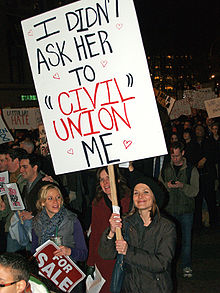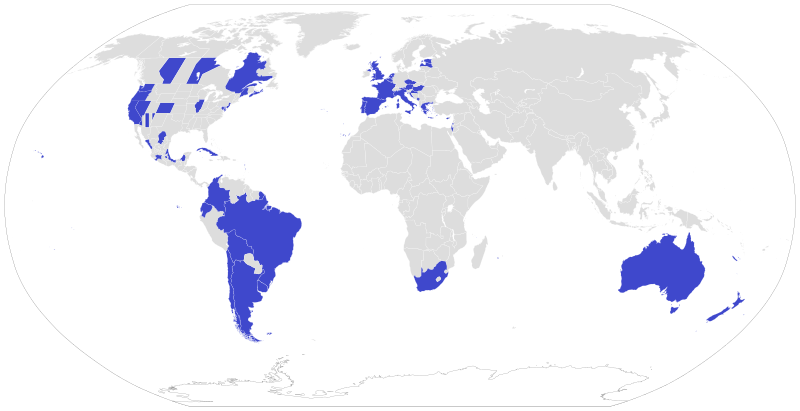A civil union (also known as a civil partnership) is a legally recognized arrangement similar to marriage, created primarily as a means to provide recognition in law for same-sex couples. Civil unions grant some or all of the rights of marriage except child adoption and/or the title itself.
Civil unions under one name or another have been established by law in several, mostly developed, countries in order to provide legal recognition of relationships formed by unmarried same-sex couples and to afford them rights, benefits, tax breaks, and responsibilities similar or identical to those of legally married couples. In 1989, Denmark was the first country to legalise civil unions, for same-sex couples; however most other developed democracies did not begin establishing civil unions until the 1990s or early 2000s, often developing them from less formal domestic partnerships. While civil unions are often established for both opposite-sex couples and same-sex couples, in a number of countries they are available to same-sex couples only. In Brazil, civil unions were first created for opposite-sex couples in 2002, and then expanded to include same-sex couples through a supreme court ruling in 2011. In the majority of countries that established same-sex civil unions, they have since been either supplemented or replaced by same-sex marriage. Civil unions are viewed by LGBT rights campaigners as a "first step" towards establishing same-sex marriage, as civil unions are viewed by supporters of LGBT rights as a "separate but equal" or "second class" status.
Many jurisdictions with civil unions recognize foreign unions if those are essentially equivalent to their own; for example, the United Kingdom lists equivalent unions in the Civil Partnership Act 2004 Schedule 20. The marriages of same-sex couples performed abroad may be recognized as civil unions in jurisdictions that only have the latter.
Overview and terminology
The terms used to designate civil unions are not standardized, and vary widely from country to country. Government-sanctioned relationships that may be similar or equivalent to civil unions include civil partnerships, registered partnerships, domestic partnerships, significant relationships, reciprocal beneficiary relationships, common-law marriage, adult interdependent relationships, life partnerships, stable unions, civil solidarity pacts, and so on. The exact level of rights, benefits, obligations, and responsibilities also varies, depending on the laws of a particular country. Some jurisdictions allow same-sex couples to adopt, while others forbid them to do so, or allow adoption only in specified circumstances.
In the United States, the term civil union was introduced in the state of Vermont in 2000 to connote a status equivalent to marriage for same-sex couples; it was chosen by the state's legislators in preference to phrases such as "domestic partner relationship" or "civil accord".
Domestic partnership, offered by some states, counties, cities, and employers since as early as 1985, has generally connoted a lesser status with fewer benefits. However, the legislatures of the West Coast states of California, Oregon and Washington have preferred the term domestic partnership for enactments similar or equivalent to civil union laws in East Coast states.
Civil unions are not seen as a replacement for marriage by many in the LGBT community. "Marriage in the United States is a civil union; but a civil union, as it has come to be called, is not marriage", said Evan Wolfson of Freedom to Marry. "It is a proposed hypothetical legal mechanism, since it doesn't exist in most places, to give some of the protections but also withhold something precious from gay people. There's no good reason to do that." However, some opponents of same-sex marriage claim that civil unions rob marriage of its unique status; Randy Thomasson, executive director of the Campaign for California Families, calls civil unions "homosexual marriage by another name" and contends that civil unions provide same-sex couples "all the rights of marriage available under state law". The California Supreme Court, in the In Re Marriage Cases decision, noted nine differences in state law.
Civil unions are commonly criticised as being 'separate but equal'; critics such as former New Zealand MP and feminist Marilyn Waring note that same-sex couples remain excluded from the right to marry and are forced to use a separate institution. Supporters of same-sex marriage contend that treating same-sex couples differently from other couples under the law allows for inferior treatment and that if civil unions were the same as marriage there would be no reason for two separate laws. A New Jersey commission which reviewed the state's civil union law reported that the law "invites and encourages unequal treatment of same-sex couples and their children". Some have suggested that creating civil unions which are open to opposite-sex couples would avoid the accusations of apartheid.
Proponents of civil unions say that they provide practical equality for same-sex couples and solve the problems over areas such as hospital visitation rights and transfer of property caused by lack of legal recognition. Proponents also say that creating civil unions is a more pragmatic way to ensure that same-sex couples have legal rights as it avoids the more controversial issues surrounding marriage and the claim that the term has a religious source.
Many supporters of same-sex marriage state that the word 'marriage' matters and that the term 'civil union' (and its equivalents) do not convey the emotional meaning or bring the respect that comes with marriage. Former US Solicitor General and attorney in the Perry v. Schwarzenegger case Theodore Olsen said that recognizing same-sex couples under the term 'domestic partnership' stigmatizes gay people's relationships, treating them as if they were "something akin to a commercial venture, not a loving union". Many also contend that the fact that civil unions are often not understood can cause difficulty for same-sex couples in emergency situations.
List of jurisdictions recognizing same-sex unions but not same-sex marriage
As of August 13, 2022, the states that provide civil unions but not marriage for same-sex couples are:
- Andorra
- Bolivia
- Croatia
- Cyprus
- Czech Republic
- Estonia
- Greece
- Hungary
- Italy
- Latvia
- Liechtenstein
- Monaco
- Montenegro
- the Netherlands state of Aruba
- San Marino
- the British territories of Bermuda and Cayman Islands
List of jurisdictions recognizing same-sex unions
The following is a list of countries and other jurisdictions which have established civil unions for same-sex couples or opposite-sex couples, categorized by continent, with the year in which the law establishing civil unions in the listed country or other jurisdiction came into effect in brackets.



